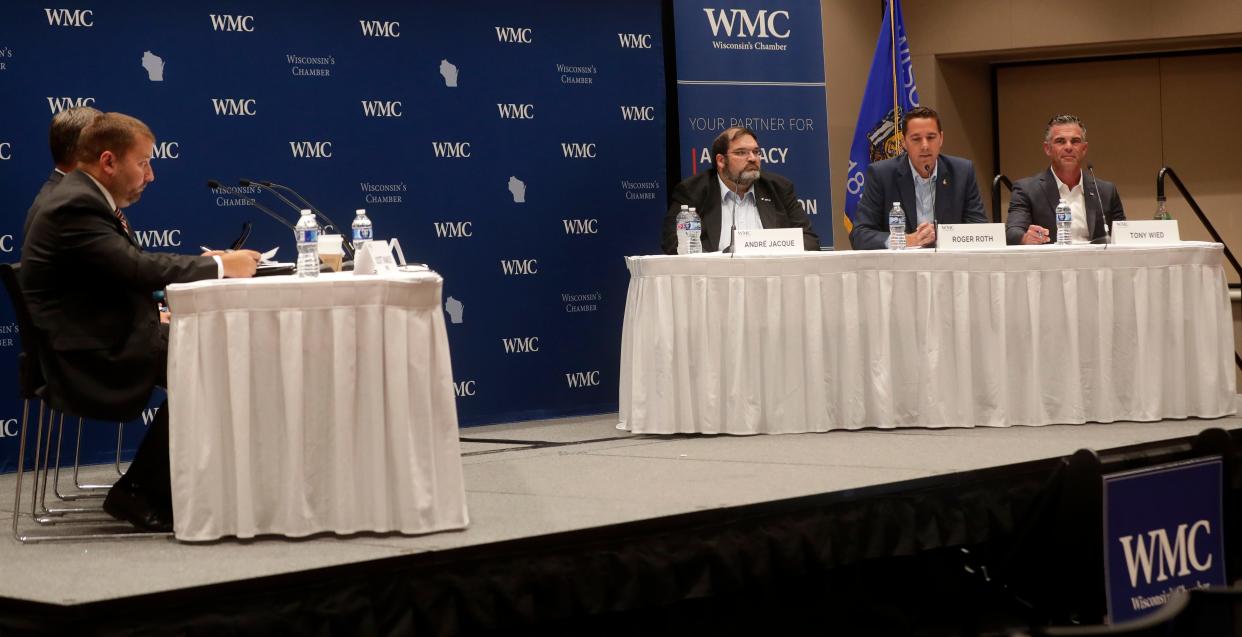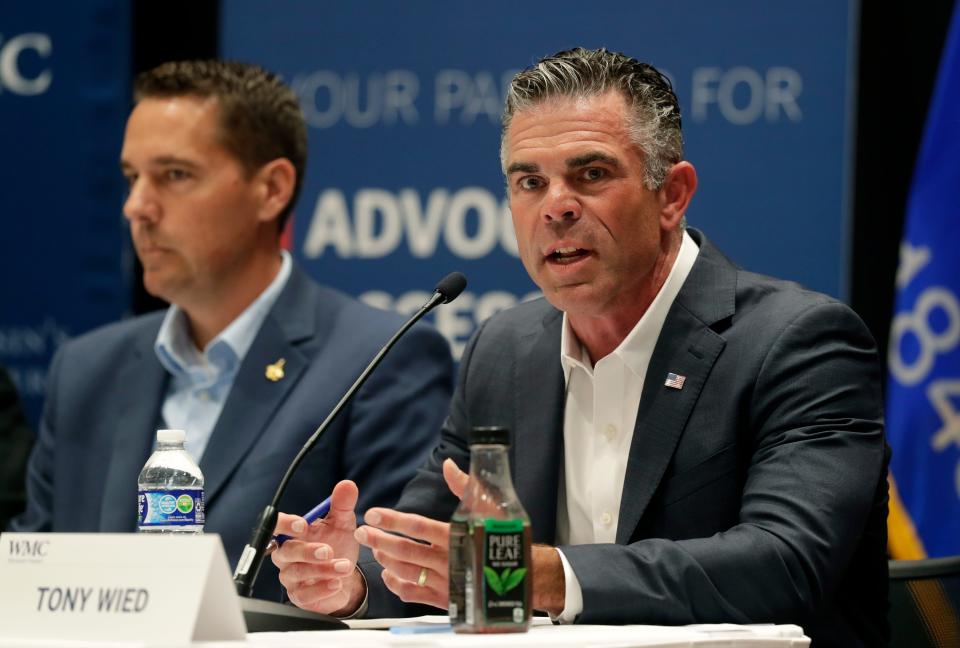Economy takes center stage at debate of Wisconsin's 8th Congressional District Republicans

- Oops!Something went wrong.Please try again later.
- Oops!Something went wrong.Please try again later.
- Oops!Something went wrong.Please try again later.
- Oops!Something went wrong.Please try again later.
- Oops!Something went wrong.Please try again later.
GREEN BAY — A Thursday debate pressed three Republican contenders for former Rep. Mike Gallagher's 8th Congressional District seat on questions about the economy, picking up where last week's forum left some attendees unsure of specifics on each candidate's economic platform.
Wisconsin Manufacturers and Commerce, the state's largest business association, invited state Sen. Andre Jacque from De Pere, former state Sen. Roger Roth from Appleton, and local businessman Tony Wied of De Pere for their second debate, on Thursday in downtown Green Bay's KI Convention Center.
The hall that could seat 75 was at half capacity when the debate discussing the American economy started just past most people's workweek lunch hour.
"Give us a good show," said one of the attendees to Jacque as he made his rounds through the isolated islands of people in polo shirts, navy suits, and button-downs. A third of the crowd were family members of the candidates.
Americans overwhelming believe that strengthening the economy should be the next president's top priority, according to a Pew Research Center study from February. A Marquette Law School poll from June confirmed this trend among Wisconsinites.
Whereas the first debate left questions on the economy until the fourth quarter, and dedicated three minutes out of the two-hour event due to time constraints, the second debate's three-person moderating panel asked the candidates to define their stances on issues spanning inflation, interest rates, immigration, employment, energy, taxes, tariffs, and health care for 90 minutes.
Details of the candidates' economic agendas were sparse on their respective campaign websites before the debate. Roth had promised to "end Bidenomics" in a website banner. Wied had pledged to "curb out of control spending," reduce government regulations to "unleash America's energy potential," and "[support] Wisconsin agriculture" under his campaign website's "Issues" tab. Jacque's campaign website had no policy agendas published.
This forum provided the most detailed look into each candidate's economic policy platforms before voters go to the polls in August.
Here are the some of the takeaways:
The star of the show: Kamala Harris
Behind former President Donald Trump, the most referenced person of the debate was Vice President Kamala Harris, the all-but-named Democratic presidential nominee after President Biden dropped out of the race on Sunday.
Candidates often referred to policies passed by the "Harris-Biden" administration, putting the vice president in front of President Biden on issues of inflation, the bloated bureaucracy, and taxes.
"It goes to show how far left we've lurched left under Kamala Harris and Bernie Sanders and the Democratic Party," Jacque said in response to a question on employer-sponsored health care, equating the Vermont politician's self-described socialist beliefs with Harris and the rest of the Democratic Party.
Reagan-era conservatism in Trump's party
If Harris and Trump were the candidates' most preferred references, the phrase "reckless spending" placed a close third. Behind Harris, "the bureaucracy" was the second punching bag of choice.
All three candidates saw deregulation, lowering corporate taxes, and smaller government as solutions to everything from inflation to elevated interest rates and medical bills.
"The beast is government," Jacque said. "We need to end the [Federal Reserve]."
Wied declared that he believed that the "agency state" qualified as a fourth branch of government.

'Let the market decide' except in matters of national security
While all of the candidates believed that a free market within the United States would promote the best business-friendly environment, they were willing to support tariffs in order to protect American national security.
"I support the free market, but I also believe in fair trade," Jacque said. "And China's not played fair."
Tariffs, such as the ones imposed on many Chinese and European goods under the Trump administration and continued into the Biden administration, were acknowledged by the candidates and the WMC to largely burden consumers in the end. However, the candidates believed that the distortion of the market could be used to project American strength.
"Trump knows how to negotiate," Wied said. "He's a great dealmaker, and tariffs can be used for negotiation purposes."
Not the businessman, the businessmen
Many of Wied's answers began with reference to Trump, paralleling Trump's business experience with his own as a small business owner who ran Dino Stop, a chain of dinosaur-themed gas stations across Wisconsin, Minnesota, and Texas.
During a question about how the candidates would stop bureaucrats from imposing policies that are regarded as restrictive to business growth, Wied started his answer mentioning his status as the "only businessman" in the race.
Roth, whom the audience saw to have largely faded into the background during the first debate, sought to correct the record in one of his most forceful moments on stage.
"I just want to correct something that was said earlier: I own a business," he said during a question on tariffs. "I've been a homebuilder here in northeast Wisconsin for 25 years."
Post-debate audience a family affair
Attendees melted away at the end of the debate, back to the work day, leaving the pile of brownies largely untouched. The families of the candidates, many of whom arrived well in advance, were the last ones to leave.
With the last scheduled debate over, voters will make a decision based on all they've heard from the candidates.
The winner of the Republican primary on Aug. 13 will face Dr. Kristen Lyerly, the sole Democratic challenger, in November.
Voters will make two choices on the same ballot in both elections: who will fill finish out the former representative's term until Jan. 3, 2025, and who will serve a complete stint in the House of Representatives until 2027.
Jesse Lin is a Press-Gazette reporter covering Green Bay and politics in northeastern Wisconsin. Contact him at jlin@gannett.com or call 920-431-8247.
This article originally appeared on Green Bay Press-Gazette: Wisconsin 8th Congressional District Republicans on economy in debate

